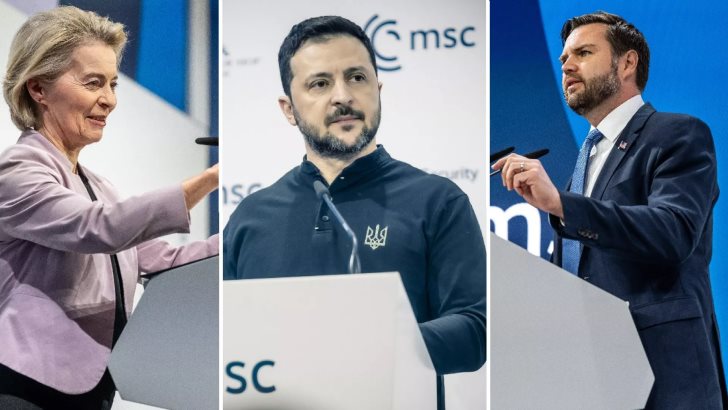
The 2025 Munich Security Conference (MSC), held from February 14 to 16, was marked by intense discussions on global security and evolving geopolitical dynamics. However, one striking element dominated the conversations behind closed doors: the war in Ukraine. Despite expectations that Ukraine would be the central theme, U.S. Vice President J.D. Vance delivered a speech that conspicuously omitted the conflict, sparking controversy among attendees and highlighting growing divisions in international diplomacy.
This omission is particularly noteworthy given the ongoing war in Ukraine, which continues to have profound effects on global security and international relations. European leaders were reportedly stunned that Vance, in his much-anticipated address, did not mention Ukraine once, despite the fact that many participants expected the conflict to be a focal point of the conference. The absence of any reference to the war was interpreted by some as a signal of shifting U.S. priorities, raising questions about the future of American involvement in the conflict and its support for Ukraine.
Vice President J.D. Vance's Address: A Strategic Shift?
In his speech, Vance emphasized U.S. national security priorities but noticeably sidestepped the war in Ukraine. Instead, he focused on China’s growing influence, urging for a recalibration of American foreign policy to concentrate on key strategic regions like the Indo-Pacific. Vance argued that the U.S. should avoid further "entanglements" in conflicts that do not serve immediate national interests—an implicit reference to Ukraine, according to some analysts.
His remarks also suggested that Europe should take on more responsibility for its own security, particularly regarding Russia and the conflict in Ukraine. While reaffirming the importance of NATO, Vance made it clear that the U.S. is shifting its focus towards countering China, leaving European leaders to manage the security risks closer to their borders.
What’s more, sources at the conference revealed growing concerns that the U.S. is bypassing European partners in ongoing peace negotiations with Russia over Ukraine. Reports suggest that American officials are holding back-channel talks with key stakeholders, including China, in an attempt to broker a peace deal without European involvement. This has led to growing unease in European capitals, where leaders feel increasingly sidelined in decisions that directly affect their own security interests.
Boris Pistorius: A Call for European Leadership and Multilateralism
Germany’s Defense Minister Boris Pistorius was quick to respond, adjusting his speech to address the elephant in the room: Ukraine. Unlike Vance, Pistorius highlighted the war in Ukraine as a key issue for European security. He argued that Europe must stand united in its support for Ukraine and in the broader effort to counter Russian aggression. Pistorius made it clear that European security cannot be ensured without a resolution in Ukraine, and he pushed back on the idea that the U.S. should pivot away from the continent.
Pistorius also made a case for strengthening NATO, emphasizing that the alliance remains the backbone of European defense. He acknowledged that Europe must increase its defense capabilities and take on a larger share of the security burden, but he warned that any U.S. disengagement from European security could destabilize the region and embolden Russia. Pistorius stressed that multilateralism—a principle championed by Germany and other European nations—must guide international efforts to resolve global crises, including the war in Ukraine.
U.S.-Europe Tensions Over Ukraine Peace Talks
The growing tension between the U.S. and Europe over Ukraine peace negotiations became a central theme of the conference, even if it was not addressed directly in Vance's speech. Reports suggest that the U.S. is pursuing a peace settlement that prioritizes a swift end to the conflict, even if that means concessions that Europe might find unacceptable. European leaders, particularly in countries like Germany and Poland, have voiced concerns that a rushed peace deal could result in a frozen conflict, leaving Ukraine vulnerable to future Russian aggression.
This division over the handling of the Ukraine war reflects broader differences in how the U.S. and Europe view their roles in global security. While Vance’s speech suggested a pivot away from Europe and a focus on the Indo-Pacific, European leaders like Pistorius emphasized that the war in Ukraine is not just a European issue, but one with global consequences. European nations are worried that the U.S.'s perceived disengagement could weaken the Western alliance and make it more difficult to secure a durable peace in Ukraine.
The Future of Global Alliances Post-MSC
The 2025 Munich Security Conference has highlighted the growing divergence between the U.S. and Europe on how to manage the ongoing war in Ukraine and broader global security concerns. Vice President Vance's speech, which emphasized China and downplayed Europe's security challenges, marks a potential turning point in U.S. foreign policy. The fact that Ukraine was not mentioned at all in his address has raised alarm bells among European leaders who fear that the U.S. is no longer fully committed to the continent’s security, particularly in light of the war on its doorstep.
Meanwhile, Germany's Defense Minister Boris Pistorius made it clear that Europe cannot afford to take a back seat in its own defense. His speech underscored the importance of multilateralism and cooperation, warning against the dangers of unilateral action in resolving conflicts like Ukraine.
Looking ahead, international relations will be shaped by how these contrasting visions of global security play out. The U.S. appears to be signaling a strategic pivot away from Europe, while European nations are scrambling to adjust to the possibility of greater self-reliance in security matters. The unresolved issue of Ukraine, combined with reports of U.S. back-channel peace talks, could strain transatlantic relations in the coming months.
The future of global alliances—whether through NATO, bilateral agreements, or multilateral cooperation—remains uncertain as nations reassess their roles on the world stage. The 2025 MSC has made one thing clear: the decisions made in the coming months will have long-lasting effects on international relations, global security, and the stability of Europe.




















